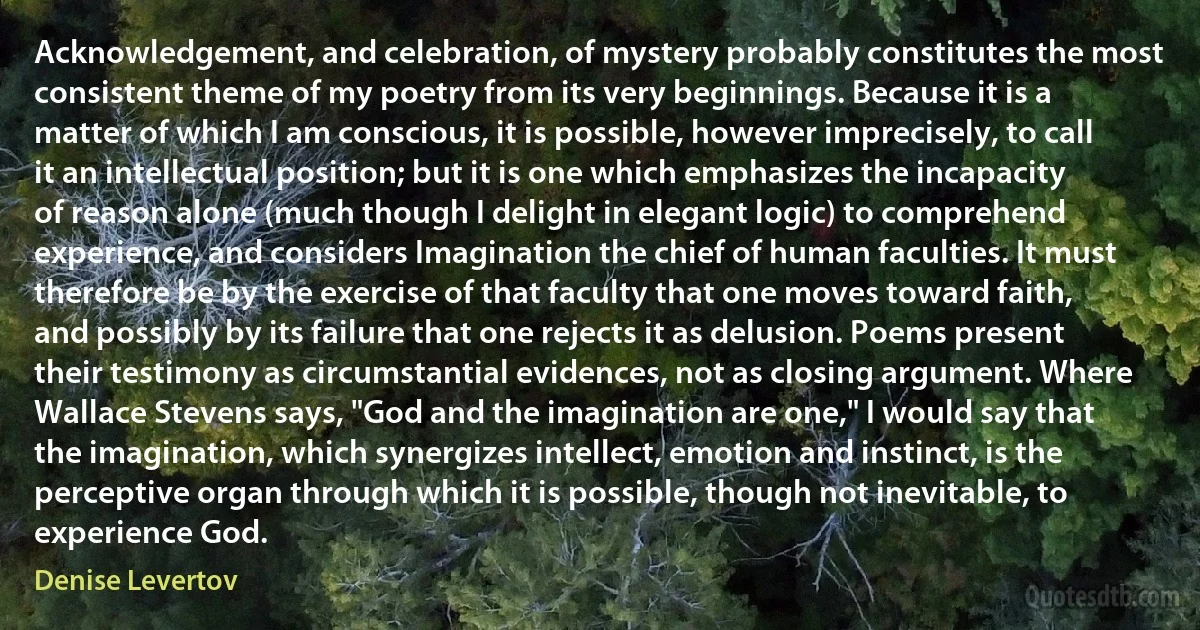
Acknowledgement, and celebration, of mystery probably constitutes the most consistent theme of my poetry from its very beginnings. Because it is a matter of which I am conscious, it is possible, however imprecisely, to call it an intellectual position; but it is one which emphasizes the incapacity of reason alone (much though I delight in elegant logic) to comprehend experience, and considers Imagination the chief of human faculties. It must therefore be by the exercise of that faculty that one moves toward faith, and possibly by its failure that one rejects it as delusion. Poems present their testimony as circumstantial evidences, not as closing argument. Where Wallace Stevens says, "God and the imagination are one," I would say that the imagination, which synergizes intellect, emotion and instinct, is the perceptive organ through which it is possible, though not inevitable, to experience God.
Denise LevertovRelated topics
argument call chief circumstantial delight delusion experience faculty failure faith human incapacity intellectual matter position possible present reason say theme movesRelated quotes
It seems that cybernetics is many different things to many different people. But this is because of the richness of its conceptual base; and I believe that this is very good, otherwise cybernetics would become a somewhat boring exercise. However, all of those perspectives arise from one central theme; that of circularity. When, perhaps a half century ago, the fecundity of this concept was seen, it was sheer euphoria to philosophize, epistemologize, and theorize about its unifying power and its consequences and ramification on various fields. While this was going on, something strange evolved among the philosophers, the epistemologists and, the theoreticians. They began to see themselves more and more as being included in a larger circularity; maybe within the circularity of their family; or that of their society and culture; or even being included in a circularity of cosmic proportions!

Heinz von Foerster
I shall present a theory - which I call "the theory of the managerial revolution." During the past century, dozens, perhaps even hundreds, of "theories of history" have been elaborated. All of the theories, with the exception of those few which approximate to the theory of the managerial revolution, boil down to two and only two. The first of these predicts that capitalism will continue for an indefinite, but long, time, if not forever:' that is, that the major institutions of capitalist society, or at least most of them, will not be radically changed. The second predicts that capitalist society will be replaced by socialist society. The theory of the managerial revolution predicts that capitalist society will be replaced by "managerial society," that, in fact, the transition from capitalist society to managerial society is already well under way.

James Burnham
Take a moment to remember the times on your own spiritual quest when you felt most enthusiastic. We want to pinpoint the times in which we felt more God conscious and devotional than ever before. Conversely, look at the times when you felt unenthused and do a similar analysis. These questions might help stimulate your thought process: Are you enthusiastic about your existence as a servant of the Lord? Are you enthusiastic to follow the basic principles that will help elevate your consciousness? Are you enthusiastic in the association of saintly people? Are you enthusiastic about what you can experience in your purest state? We must examine our spiritual life on a daily, weekly, and even yearly basis. This examination will help us recognize how various activities and thoughts affect us. We should note how the quality of our experiences varies according to our absorption in the process of bhakti.

Bhakti Tirtha Swami
In fact, the only person to rival Friedman for policy influence in the twentieth century is John Maynard Keynes, who had a strikingly different view of the role of government. Keynes was influential because he advocated more government intervention into what he perceived as poorly functioning private economies caught up in the Great Depression. In contrast to Keynes, Friedman put the main blame for the Depression on government failures, especially of monetary policy. Hence, the Depression did not make Friedman a fan of big government. He also found in the Federal Reserve's failure to prevent deflation an argument in favor of monetary rules. As the world evolved- with low inflation becoming the major mission of central banks and free markets and secure property rights becoming the main policies to promote economic growth-Friedman surely won the intellectual battle.

Robert Barro
This Prime Minister must be drummed from office and we will use each and every opportunity to make that a reality...But this Prime Minister deserves to be impeached - and we, with others, will present the case that he should be required to answer...I believe that this Prime Minister now operates outside the currency of debate, beyond the pale of decency...I don't just challenge the policies of Tony Blair, I challenge his morality...This is not a question of this Prime Minister - any prime minister - making a judgement call and just being wrong. It is not a matter, as Blair would have us believe, of someone acting in good faith and making an honest mistake. This is a man who buried the intelligence that was inconvenient, manipulated the information to suit his purpose, and entered into a secret pact with the American President to go to war come what may.

Alex Salmond
